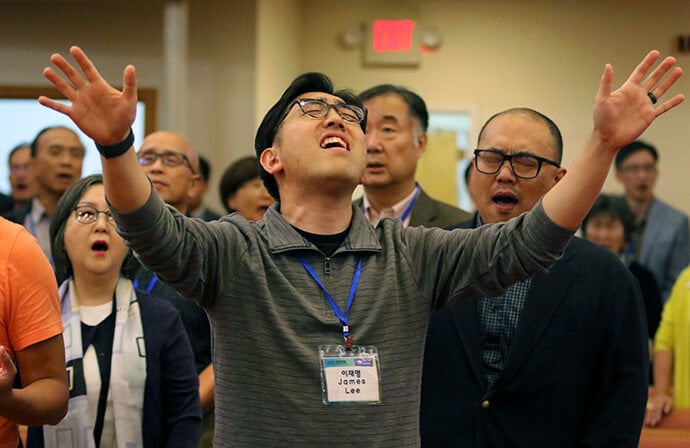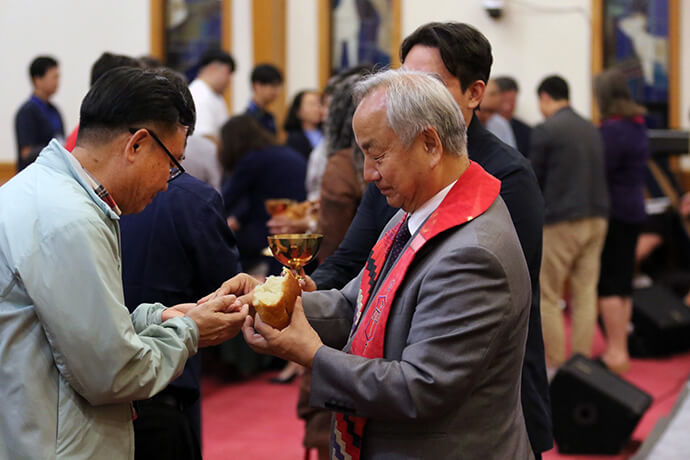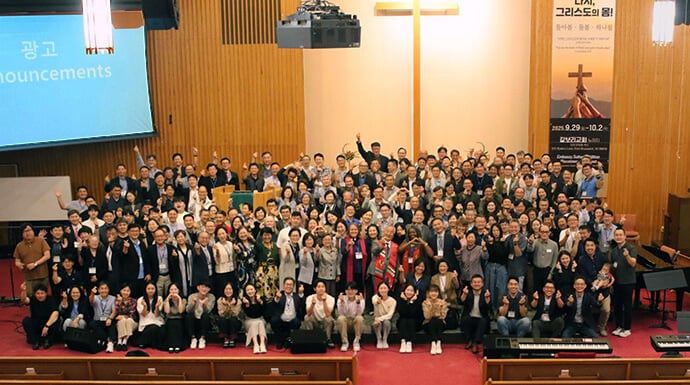Key points:
- The Korean Association of The United Methodist Church held its 2025 convocation Sept. 29-Oct. 2 at Calvary Korean United Methodist Church under the theme, “Again, the Body of Christ: Looking Back. Caring. Strengthening the Body of Christ!” (1 Corinthians 12:27).
- The gathering brought together 221 registered pastors, laity and ministry leaders from across the United States along with additional guests from the local community for worship, lectures, mission reports, business sessions and fellowship.
- Mission was one of the central themes, as the Korean United Methodist Church continues its commitment to financially support the 140 missionaries of the Board of Global Ministries.
The Korean Association of The United Methodist Church held its 2025 convocation Sept. 29-Oct. 2 at Calvary Korean United Methodist Church under the theme, “Again, the Body of Christ: Looking Back. Caring. Strengthening the Body of Christ!” (1 Corinthians 12:27).
The gathering brought together 221 registered pastors, laity and ministry leaders from across the United States along with additional guests from the local community for worship, lectures on “public church,” mission reports, business sessions and fellowship.
Bishop Cynthia Moore-Koikoi, who leads the Greater New Jersey and Eastern Pennsylvania conferences, welcomed the assembly. Drawing on an African cultural proverb, she reminded participants, “When guests arrive, blessing arrives,” commending Calvary’s “radical hospitality as a manifestation of the love of Christ.”
The Rev. Changmin Lee, the association’s outgoing president and pastor of Zion Korean United Methodist Church in Carson, California, acknowledged the difficult times the denomination has weathered of late.
“In the midst of hardships over the past year, you stood fast to keep us, and today we gather again,” he said. “Through these three nights and four days, let us look back, care for one another and strengthen our ‘we-ness.’”

Opening worship featured vibrant music by Deullio, a fusion gugak (Korean traditional music) praise team from Korea, drawing rhythmic clapping from the congregation. The Rev. Hoonkyung Lee’s invocation interceded for a fractured world — mentioning the war in Ukraine, political polarization and the division within the United States and the Korean Peninsula.
“Use us as instruments of the Gospel and ambassadors of reconciliation,” he prayed.
Subscribe to our
e-newsletter
The evening sermon was delivered by the Rev. Young Seon “Christina” Kim, a United Methodist Board of Global Ministries missionary to Tanzania. Preaching from Psalm 103:2 under the theme “Looking Back, It Was Grace,” she reflected on the value of pausing amid ministry busy-ness: “Faith is not only running toward the next task; it is also stopping to look back and re-recognize the grace already given and the God who has walked with us.”
Kim acknowledged ongoing denominational wounds but emphasized perseverance.
“The head of the church is unchangingly Christ,” she said. “Taking one more step forward is itself evidence of grace.”
Mission remained one of the central themes of the gathering throughout the week. The Rev. Judy Chung, Global Ministries’ executive director of missionary service, provided a video update highlighting clean water, sanitation, agriculture and training women projects.
“Support is not only funding,” she said. “It’s a promise of prayer and accompaniment.”
The Rev. Jae-Hyung Choi, a missionary in residence, lifted up the Korean United Methodist Church’s commitment to supporting the 140 Global Ministries missionaries for a three-year period.
Choi called the commitment “a mustard seed of hope that assures every worker, ‘You are not alone.’”

The Rev. Eunha Kim, another missionary in residence, reported that 41 churches and eight individuals have pledged sponsorships, with additional participation bringing support for about 170 missionaries. By July, offerings totaled $106,090.
The convocation also took time to bless newly ordained clergy and retiring pastors, affirming the passing of ministry across generations, and to celebrate the Lord’s Table. Holy Communion was jointly presided over by Bishops Hee-Soo Jung, the leader of East and West Ohio conferences; Dottie Escobedo-Frank of the California-Pacific Conference; and Moore-Koikoi, with three newly ordained clergy.
The Rev. Ilseop Ahn, professor of philosophy at North Park University in Chicago, led a two-day lecture series on “public church,” which he described as going “beyond the worshiping assembly to witness and enact God’s justice, peace and life in society’s public square: politics, media, education and civil society.”
He emphasized the theme of “Apologies and Reckoning,” asserting that “a true public church requires sustained repentance for colonial complicity.” Citing Pope Francis’ 2015 apology for the church’s sins against the Indigenous people of Latin America as a starting point, he added, “A public church faces history and transforms reckoning into habits of life and policy.”
Man Keum Choi, president of the National Association of Korean United Women in Faith and a lay member of Korean United Methodist Church of Santa Clara Valley in San Jose, California, reported tracing three decades of training and organizing since 1993, now serving nine U.S. regions. She asked pastors for encouragement, participation and prayer as they expand their witness through “training, seminars and solidarity.”
That evening, the Rev. James Jaemyung Lee, lead pastor of Hope United Methodist Church, Voorhees, New Jersey, and president of NEXUS, a ministry by, for and with the next generations of Korean Americans in The United Methodist Church, led a prayer of care, peace, family and next generation with words of han (deep sorrow) and jeong (enduring bond), asking God to transform division into reconciliation.
In his sermon “Healing the Body of Christ” (1 Corinthians 13:1–13), the Rev. Ken (Kyung-Deok) Suhr — director of Leadership and Congregational Vitality at the California-Pacific Conference — said the church, as the body of Christ, is hurting and in need of healing. He proposed three pathways toward restoration: humility, apology and incarnation.
Through humility, Suhr said that “the real Jesus is bigger and better than my Jesus.” In apology, he shared his own experience, saying, “Our greatest apologetics could be our apologies.” Finally, through incarnation, he called Christians to move from receiving blessings to becoming a blessing — leaving comfort zones to listen and learn as guests, as Jesus did.

The association also heard a report on the upcoming 2030 Conference, a Thanksgiving retreat for college and graduate students in their 20s and 30s. The Rev. Dae-Uk Kim of Jesus Love Korean United Methodist Church in Champaign-Urbana, Illinois, described it as “an American counterpart to KOSTA, now drawing alumni with their teenage children.” KOSTA (Korean Students All Nations) is a well-known Christian movement and conference that equips Korean students and young professionals worldwide for discipleship and mission.
Before electing new leadership, business sessions amended bylaws to reorganize a nominations committee representing its various constituencies: pastors serving Korean churches, NEXUS, NAKAUMPSCRA (National Association of Korean American United Methodist Pastors Serving Cross Racial/Cultural Appointment), and NAKAUMC (National Association of Korean American United Methodist Clergywomen), Korean Mission directors and United Women in Faith. With this change, the association has become more inclusive and now better reflects the diversity of its body.
This year’s gathering coincided with Calvary Korean United Methodist Church’s 50th anniversary. Bishops Moore-Koikoi and Jung attended the celebration, while New York Bishop Thomas J. Bickerton sent a message of celebration, commending the congregation for its faithful witness.
The Rev. Sangwon Do, superintendent of the Raritan Shore District and Calvary’s former pastor, said of the church that “Christ broke down the walls dividing hostile groups and created ‘one new humanity’ — the church, where diverse people are united through humility, gentleness and patience in the Spirit.”
At the closure of the convocation, the association elected the Rev. Hyok-In Kwon, lead pastor of Korean United Methodist Church of Santa Clara Valley in San Jose, California, as its new president.
Pledging to widen participation and strengthen lay movements, Kwon said, “We will listen well and build together.”
Outgoing association president Changmin Lee closed with a sermon on Luke 5:1–11, recalling Peter’s call to leave his nets: “Our churches and generations are woven together like a net. When pastors and laity, the young and old, are tied together in Christ, we become a net that catches people for God.”
Reflecting on the significance of the Korean association gathering, Bishop Jung lifted up “its willingness to speak of the public church and to focus on that theme.”
Recovering the church’s public witness, rather than remaining trapped in fractured histories, is “a significant stage of the message,” he said. “The fact that Korean United Methodists are reclaiming the vision of the public church and proclaiming the gospel in this way is a source of great pride.”
Kim is director of Korean and Asian news at United Methodist Communications. Contact him at 615-742-5470 or [email protected]. To read more United Methodist news, subscribe to the free UM News Digest.




